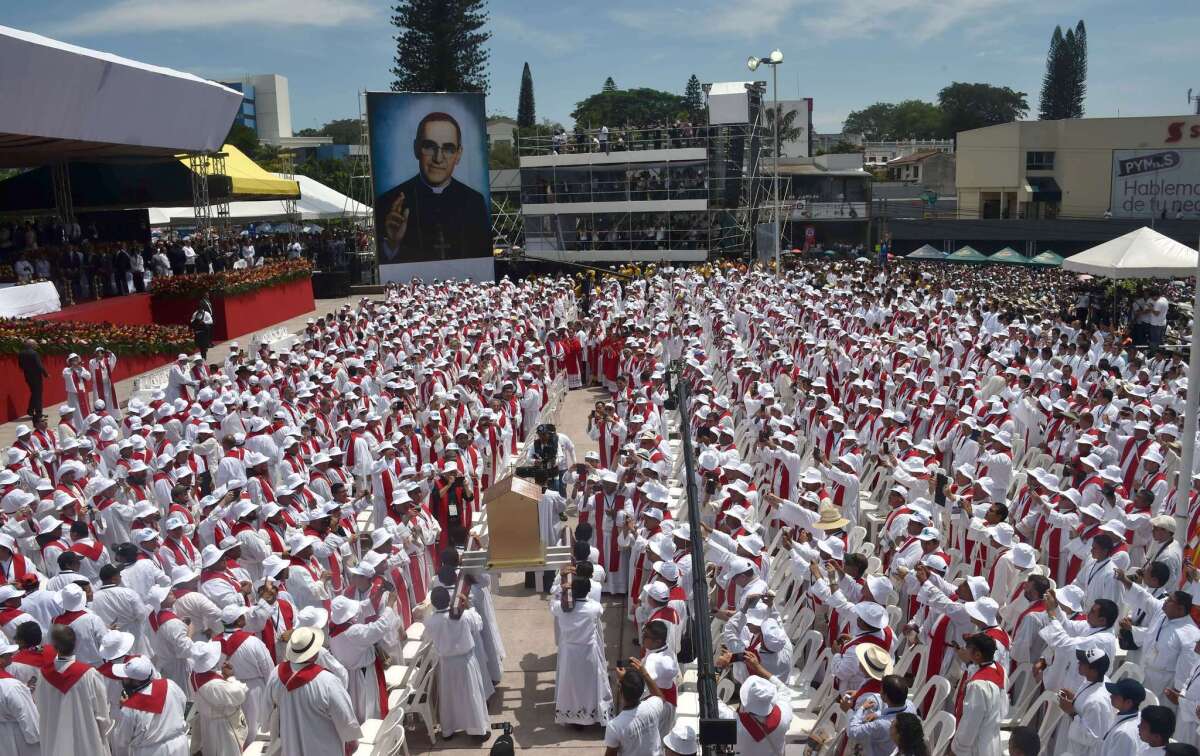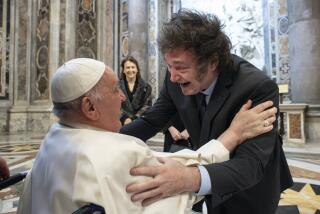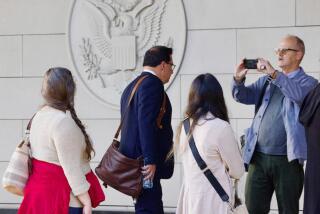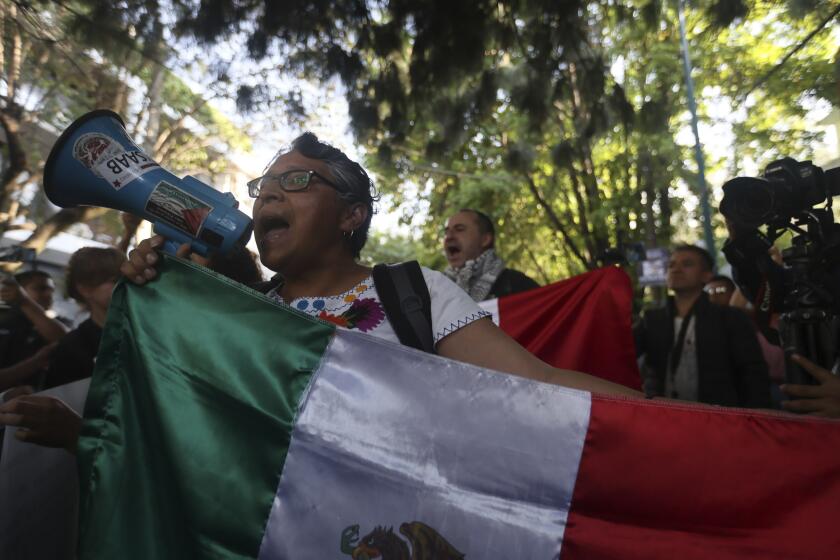Oscar Romero, slain Salvadoran archbishop, is a step closer to sainthood

Catholics participate in a Mass celebrating the beatification of Salvadorean Archbishop Oscar Romero at San Salvador’s main square on Saturday.
He refused the bodyguards and armored cars when his life was threatened. He defied yet feared death, exhorting his followers to keep the faith while facing the utmost of hardship, up to the moment an assassin’s bullet killed him.
Oscar Romero, the archbishop of San Salvador, whose slaying as he said Mass became emblematic of El Salvador’s civil war and an even broader struggle within the Roman Catholic Church, was beatified Saturday in an elaborate ceremony here, taking him one step closer to sainthood.
Tens of thousands of pilgrims from across Latin America and beyond — including, jarringly, descendants and associates of those likely to have been responsible for Romero’s death — crowded into a sunny plaza under this city’s iconic “Savior of the World” statue to witness the proceedings.
In the 35 years since Romero was assassinated by a right-wing death squad, his promotion as a saint had been resisted by conservative forces in Central America and at the Vatican, triggering a debate in the church over whether his advocacy for the poor was tainted by leftist politics.
Pope Francis, the first pontiff from the Americas, whose own work for the poor has characterized his pastoral mission, ended the resistance by declaring Romero a martyr, killed out of hatred for his faith.
That immediately cleared the way for beatification, and further marked a shift in the Catholic Church under Francis. Typically, a person can be beatified only if a miracle is attributed to him or her, but that requirement is obviated by martyrdom.
“In times of difficult coexistence, Msgr. Romero knew to guide, defend and protect his flock,” Francis wrote in a letter, read during the ceremony and formally declaring the beatification. “His ministry was distinguished by a special attention to the poorest and most marginalized.... The voice of our new Blessed continues resonating today.”
Francis indirectly dismissed those who attacked Romero for supposed Marxist political leanings. His encouragement of the poor unnerved El Salvador’s small, super-wealthy and ultra-conservative elite group of landowners and coffee tycoons who controlled the country and wanted him eliminated.
After the end of El Salvador’s civil war in 1992, and the deaths of more than 75,000 people, a United Nations Truth Commission determined that army Maj. Roberto D’Aubuisson, founder of the death squads that terrorized the nation’s poor and dissidents as well as a co-founder of the right-wing Arena party that would rule El Salvador for two decades until 2009, had ordered the killing of Romero.
D’Aubuisson died of cancer in 1992. His son, also named Roberto and mayor of a suburban city, sat toward the front of the audience at Romero’s beatification Saturday.
“Let’s not politicize this,” he said on Twitter.
Gen. Ernesto Vargas, another hard-line military commander during the war and now an Arena congressman, was also in attendance.
“Msgr. Romero was manipulated by Marxist liberation theology,” he said in a short TV interview, alluding to the pro-left strain of Catholic activism that emphasized the plight of the poor. “But I respect the Holy See’s decision and do not question the sanctification of Msgr. Romero and only hope that his image isn’t used for political ends.”
While the wealthy, church leaders and politicians occupied front rows of chairs arrayed before the stage, throngs of ordinary Salvadorans and visitors from elsewhere crowded into streets and sidewalks leading to the plaza, many with umbrellas against the sun.
Daniel Delgado, 47, a defense lawyer, brought his 5-year-old son to the event, he said, to bear witness to history. He remarked that the presence of so many of Romero’s erstwhile enemies was the ultimate hypocrisy. “They say the criminal always returns to the scene of the crime,” he said. “And there they are.”
His comments reflected the attitude among some that a church hierarchy that rarely supported Romero, coupled with some of the same business and political interests that led to his assassination, have hijacked what is by any standards a major event in Roman Catholicism. Newspapers that once attacked Romero have been publishing fawning multiple-page reports in his tribute.
Although beatifications and canonizations — the ceremony that elevates one to sainthood — can often take centuries, many in Latin America felt recognition of Romero was already long overdue.
“It fills us with emotion that something good has come from so much killing, that it was not all in vain,” Roque Arevano, a bank economist wearing a “Romero lives” T-shirt, said as he arrived at the ceremony. “If they had not killed him, a lot of lives would have been saved. That’s the challenge we have now, not to return to that.”
Some pilgrims came from afar. Romero “was an inspirational leader, committed to justice and willing to make unpopular decisions, and that’s what got him killed,” said Karen Kuchan, a 47-year-old psychotherapist from Altadena, Calif. “The prophetic voices get killed.”
Salvadoran student Ligia Abigail Lopez, 19, said she learned about Romero from her parents and movies. “He really was a martyr and died for his love of the church,” she said, marching behind a huge banner that said, “Bullets don’t murder the voice of conscience.”
The bloodied shirt that Romero was wearing when he was shot in the heart by a sniper as he said Mass at the Divine Providence chapel on March 24, 1980, was paraded in the ceremony as a relic representing the priest’s sacrifice.
Those in attendance wore shirts proclaiming Romero, a bit prematurely, a saint; others carried the words from his last Sunday homily, a day before he was killed: “I implore you, I beg you,” he had said, addressing soldiers, “I order you: End the repression!”
Special correspondent Alex Renderos contributed to this report.
More to Read
Start your day right
Sign up for Essential California for news, features and recommendations from the L.A. Times and beyond in your inbox six days a week.
You may occasionally receive promotional content from the Los Angeles Times.







